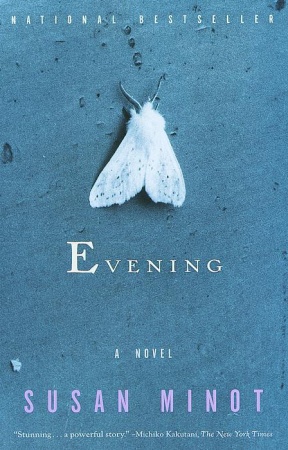 Rarely do I read books and watch their cinematic adaptations as closely together as I did with Evening. I saw the movie a few weeks ago with my mom and Caryn and followed up almost immediately by reading the novel, which has been sitting on my shelf since an impulse purchase at the Goddard Community Center book sale in November of 2005.
Rarely do I read books and watch their cinematic adaptations as closely together as I did with Evening. I saw the movie a few weeks ago with my mom and Caryn and followed up almost immediately by reading the novel, which has been sitting on my shelf since an impulse purchase at the Goddard Community Center book sale in November of 2005.
Neither the novel nor the film are perfect, and much of what fails in one fails in the other. Both follow the same basic storyline but differ significantly in almost every detail and subplot. In both, family members gather around a dying matriarch’s bedside. Their waiting is interspersed with her memories of one fateful weekend. Like every flashback-driven tale, one story is inevitably more compelling than the other; in this case, Ann Lord’s attendance at her friend Lila’s wedding, where she has a life altering but short-lived love affair, is, by far, the more interesting of the two stories, and it’s easy to get antsy wading through the the present day filler. In the book, this filler most often takes the form of Ann’s other recollections. Contrasting her memories about the weekend surrounding Lila’s wedding, which are crystalized, detailed, and acute, all other memories are hazy, half-forgotten, and run together. This impressionistic approach creates a useful juxtaposition and offers enough to outline the rest of her life. Unfortunately, it becomes increasingly irritating to read long stretches of only partially-articulated narrative, where sentences, like Ann’s memories, run together and amok. In truth, I started skimming these passages about half way through the book and skipping them all together by the last quarter.  The movie, on the other hand, uses the present day segments as an opportunity for some predictable and cloying self-growth among Ann’s daughters, and, again, the flashbacks were far more affecting. Truth be told, the reviews for the movie have been pretty unkind, which surprised me a little. Admittedly, the film is slow moving, but not every movie needs to be Live Free or Die Hard action-packed. The movie has everything to do with waiting and anticipating and deserves to be meandering and lyrical.
The movie, on the other hand, uses the present day segments as an opportunity for some predictable and cloying self-growth among Ann’s daughters, and, again, the flashbacks were far more affecting. Truth be told, the reviews for the movie have been pretty unkind, which surprised me a little. Admittedly, the film is slow moving, but not every movie needs to be Live Free or Die Hard action-packed. The movie has everything to do with waiting and anticipating and deserves to be meandering and lyrical.
The film has one of the finest ensemble casts ever assembled and my hat is off to whoever got all these amazing women in one film: even the small and somewhat thankless parts are filled with actresses of outstanding caliber (Eileen Atkins, Glenn Close). I also appreciated seeing Patrick Wilson in another film (and finally one having nothing to do with pedophilia!). On the way out are the days when only my theatre friends and I knew him, and it’s exciting to see someone who has only been known within a small community growing into a recognizable name, if not a bona fide star (yet). Really, I think he, Claire Danes, and Mamie Gummer have Meryl Streep to thank for their appearances in Evening. Wilson and Danes have both played Streep’s children before (Angels in America and The Hours) and Gummer is her real-life daughter. Nepotism (both real and fictional) is serving them all well. A shout out is also due to Hugh Dancy, who, in a part greatly changed from the novel, plays Lila’s brother with heart-breaking humanity.
I can’t give either the novel or the movie an unqualified recommendation, but I’m glad I read and watched each. I found the love story at the heart of both moving, even if the surrounding material hindered it from touching me as deeply as it should have.
Monday, July 16, 2007
A literary and cinematic Evening
at 12:38 PM
Labels: Bibliophile, Cinephile
Subscribe to:
Post Comments (Atom)

0 comments:
Post a Comment